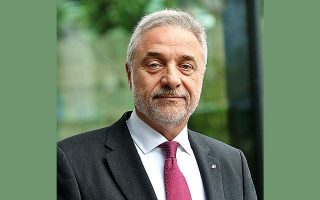Christos Megalou: The challenge of climate change determines the future

PIRAEUS BANK
The recent months, we have experienced unprecedented global developments as a result of the COVID-19 pandemic and lockdown. Greece was no exception.
Our country has managed to deal with the health issue with great success to date, acting in a timely manner and implementing strict measures. We are now in the process of restarting economic activity. As we gradually return to so-called normal, it is becoming clear that we are facing a new reality.
In the midst of a pandemic, major changes, such as the digitization of the economy and the new labor models that would have taken years to consolidate, were quickly adopted and now offer us new possibilities and opportunities. These changes apply across all levels: society, the way the state operates, entrepreneurship, the banking system, where we choose to invest, what kind of growth we want and how we ensure prosperity.
The ‘new normal’
After tackling the health issue of COVID-19, the global community is facing the next big challenge: stabilizing economies and achieving steady growth. It is therefore an opportunity to accelerate major changes, in a way that is compatible with efforts to tackle other significant global challenges, with climate change being the most important. The Greek economy will not be left out of this process.
Of course the effects of the pandemic also have serious ramifications for our country. According to our baseline scenario, Greece’s GDP is expected to decline by about 8% this year, but the trend will be dynamically reversed in 2021, so that in 2022 we will have covered the ecomomic contraction and returned to pre-crisis levels. At Piraeus Bank, we are already working on the next phase.
Our primary goal is to make effective use of the 750 billion euros recovery fund “EU Next Generation,” existing European programs and new financial instruments related to the green economy. All this, combined with the acceleration of structural reforms, will be able to attract additional private capital.
Let’s not forget that the Greek economy has suffered a prolonged recession during the domestic economic crisis of the last decade. The up to 32 billion euros expected funds from the “Next Generation EU” program, which could contribute as much as 17-18% of GDP, plus private capital can fill the investment gap and create a “positive investment shock.” Greek banks can play a key role in attracting private equity.
Investments for sustainable development
Development goals will be crucial to where the investment funds will be directed. The aim is to boost investment in productivity-oriented growth and in sectors promoted across Europe as critical to a sustainable future, such as digital transformation, innovative changes in the agri-food production process, infrastructure projects, alternative energy sources, energy storage and biodiversity protection.
In this process, the banking sector will play a crucial role. Greek banks, having sufficient capital and liquidity, are able to finance the economy in order to overcome the effects of COVID-19 and return to sustainable growth. Piraeus Bank, with new funding in 2020 that will exceed 5 billion euros, has assumed an important role in financing key areas of sustainable development, such as infrastructure, renewable energy and the agri-food sector, and supporting small and medium-sized enterprises, which are the backbone of the Greek economy.
Piraeus Bank financing in renewable energy sources (RES)
Total: €1,300 million
Wind: €660 million
Photovoltaics: €536 million
Energy saving: €49 million
Biomass and biogas: €36 million
Hydro energy: €8 million
Market share: 30%





